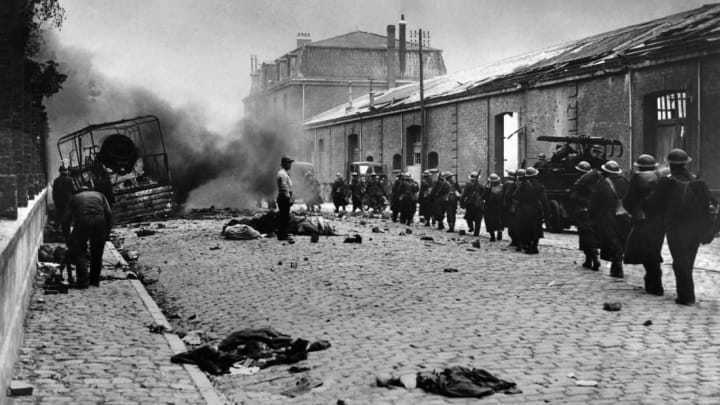With the release of Christopher Nolan’s critically acclaimed Dunkirk, the world’s attention is once again focused on the historic events recounted in the film, when a makeshift fleet of British fishing boats, pleasure yachts, and cargo ships helped save 185,000 British soldiers and 130,000 French soldiers from death or capture by German invaders during the Fall of France in May and June 1940. Here are five surprising facts about those heroic days.
1. THE GERMAN ATTACK WAS SUPPOSED TO BE IMPOSSIBLE.

The main reason France collapsed so quickly in 1940 was the element of surprise enjoyed by its German attackers, thanks to General Erich von Manstein, who proposed an invasion route that was widely believed to be impossible. In Manstein’s plan, the main German column of tanks and motorized infantry would force their way through the forests of Ardennes in southeast Belgium and Luxembourg—a thick, hilly woodland which was supposed to be difficult terrain for tanks, requiring at least five days to cross, according to conventional wisdom based on the experience of the First World War. The French and British assumed that little had changed since the previous conflict, but thanks to field studies and updated maps, Manstein and his colleague General Heinz Guderian realized that a new network of narrow, paved roads would allow just enough room for tanks and trucks to squeeze through. As a result the Germans passed through Ardennes into northern France in just two-and-a-half days, threatening to cut off hundreds of thousands of Allied troops, with only one escape route: the sea.
2. ONE FRENCH WORD WAS BURNED INTO WINSTON CHURCHILL’S MEMORY: “AUCUNE.”

The German invasion of France began on May 10, 1940, the same day Winston Churchill became Prime Minister. By May 14, when he paid his first official visit to Britain’s ally, Holland had capitulated and Paris was preparing for evacuation. But an even worse surprise was in store. In one of the most famous passages of military history, Churchill recounted the moment he learned that the French didn’t have any troops in reserve:
"I then asked ‘Where is the strategic reserve?’ and, breaking into French … ‘Ou est la mass de manoeuvre?’ General Gamelin turned to me and, with a shake of the head and a shrug, replied. ‘Aucune.’ [There is none] … I was dumbfounded. What were we to think of the Great French Army and its highest chief? It had never occurred to me than any commanders … would have left themselves unprovided with a mass of manoeuvre … This was one of the greatest surprises I have had in my life.”
3. HITLER MADE A FATAL MISTAKE.
On May 24, 1940, the Allied troops on the French and Belgian coast had been totally surrounded by powerful German tank columns, rendering them essentially defenseless against the impending German onslaught. And then came a brief reprieve, as the attackers suddenly stopped for 48 hours, allowing the British to dig in and create a defensive perimeter, setting the stage for the evacuation.
For reasons that still aren’t clear, Hitler—over the protests of his own generals and to the bafflement of historians—had ordered Guderian to halt for two days to rest and resupply. It’s true the German troops were worn out after two weeks of fighting, and Hitler may have worried about a repeat of 1914, when exhausted German troops were forced to withdraw at the Marne. He may also have been swayed by Hermann Göring, chief of the German Luftwaffe, who boasted that air power alone could destroy the helpless Allied forces at Dunkirk. Less likely is the speculation that Hitler purposefully “let the Allies go” to appear magnanimous or merciful as a prelude to peace negotiations (which was not really in keeping with his character). In the end we will probably never know why Hitler choked.
4. GERMAN DIVE-BOMBERS WERE EQUIPPED WITH SIRENS TO SPREAD TERROR.
Among many examples of Germany’s evil genius for psychological warfare, one of the most famous was the decision to equip its Ju 87 dive bombers with air-powered sirens that emitted a shrieking, unearthly wail as the plane went into attack. The siren, known as the “Jericho Trumpet,” was intended to spread terror among enemy troops and civilians on the ground—and it worked. To this day the Jericho Trumpet is one of the most recognizable, and terrifying, sounds of war. It was certainly one of the lasting impressions of the Dunkirk evacuation for ordinary troops caught beneath the German bombs. Lieutenant Elliman, a British gunner who was waiting to be evacuated on Malo-les-Bains beach, later recalled the Stukas “diving, zooming, screeching, and wheeling over our heads like a flock of huge infernal seagulls.”
5. THE FRENCH FOUGHT A HOPELESS BATTLE TO COVER THE EVACUATION.

Although Churchill and other Brits were quick to criticize the failure of France’s generals during the Fall of France, many ordinary French soldiers and officers fought bravely and honorably—and one hopeless “last stand” in particular probably helped enable the successful evacuation of Dunkirk.
As British and French troops withdrew to Dunkirk, 40 miles to the southeast French troops in two corps of the French First Army staged a ferocious defense against seven German divisions from May 28 to May 31, 1940, refusing to surrender and mounting several attempts to break out despite being heavily outnumbered (110,000 to 40,000). The valiant French effort, led by General Jean-Baptiste Molinié, helped tie up three German tank divisions under Erwin Rommel, enabling the British Expeditionary Force and the remaining troops of the French First Army to retreat and dig in at Dunkirk, ultimately saving another 100,000 Allied troops.
